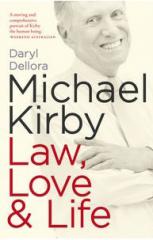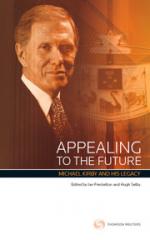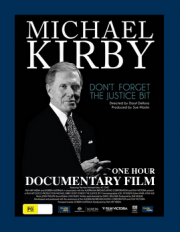INTERVIEW WITH JUSTICE KIRBY, HIGH COURT JUDGE AND HUMAN RIGHTS ADVOCATE
By Sam Flynn
Justice Kirby is one of the most renowned jurists and human rights advocates of current times. We had the pleasure of sitting down with him to talk about human rights, access to justice and the future of the law.
For our international audience, can you tell us a little about your career?
I went to the University of Sydney under a scholarship scheme made available by the Commonwealth government, after which I became a young lawyer and then barrister. My work varied but was substantially in the field of industrial relations. I was appointed as a Judge to the Federal Court in 1983, and subsequently to the High Court of Australia. Since then, I have been involved in a lot of work for the United Nations, which continues today.
You are renowned for your advocacy in the human rights and social justice space. What role do you think lawyers can play in that work?
Many human rights are expressed in universal human rights law, as acknowledged in instruments like the 1948 Universal Declaration of Human Rights, which were then signed and ratified by countries like Australia.
While these instruments provide a foundation, it is merely a that: a foundation. It is necessary to build human rights in our country and world on the basis of knowledge, education, civil society, political action and social policy.
The law gives us a language to express human rights. Practicing in their individual countries, lawyers can express human rights by criticising failures of government, the legislature and their own profession and by representing those who human rights are not protected or upheld.
At a recent conference, you noted that Australia has a "Rolls Royce" system of law, but that not everyone needs a Rolls Royce. What did you mean by that?
This statement was first uttered in my presence by a distinguished German Judge, Dr Wolfgang Zeidler, who was then President of the German Constitutional Court. He said that Australia had a wonderful legal system, the “Rolls Royce of legal systems,” whereas Germany had the “Volkswagen of legal systems.”
He then asked: “However, how many citizens can afford a Rolls Royce? And how many can afford a Volkswagen?” What he meant by this was that our system is very good if you can get to it. But, if you’re on the outside, it is difficult to find and it is expensive.
It is no good having a wonderful legal system expressed in the language of legislation and constitution if the practical situation is that ordinary citizens cannot access it.
And what can we do about that, in your view?
We must look at the civil law systems, which are derived from the legal systems of countries like France and Germany, rather than the common law system of the United Kingdom.
In civil law countries, the judge does a lot of the work in securing the evidence to make a decision. That is not the tradition of the common law, which is not dissimilar to a sporting contest, in which the judge is not supposed to be a player, but rather an impartial umpire.
There are advantages to the common law system, particularly because the judge can enter the conflict without any preconception about the proper outcome. However, not all lawyers are equally talented, advocates in court tend to be expensive and it can take longer. Australia’s legal system is time-consuming and expensive, and so the question of Dr Zeilder still hangs in the air: how many can afford a Rolls Royce?
We could also look at the provision of legal services through different models, like the establishment of community legal centres and other bodies where there is expertise that is available for free or at a cheaper rate. This could be of assistance for relatively straightforward disputes and matters, like small contract disputes or neighbour disputes.
We started Josef in the belief that, through the use of technology like automation, we can help in addressing the access to justice gap. What is your response to that mission?
Another potential solution to the accessibility of the law to ordinary citizens is new technology and artificial intelligence. A lot of attention is now being paid to how artificial intelligence can improve the throughput of routine cases.
Artificial intelligence is intruding into the making of many decisions in society that would previously have been made by a human. For example, when we go to the airport and pass through the immigration barrier, the decision was originally made by an immigration officer looking at your passport, considering factors like how long you had been in Australia. Now, all of these steps tend to be made by automated intelligence.
We see similar applications of technology through the profession, from large taxation advisory firms which are ensuring that they don’t overlook opportunities for tax deductions and benefits, to UK courts which are made available to ordinary citizens through online applications and automated systems.
In my own practice as a young lawyer, I would frequently have to tell people that they could not bring a particular case because the costs of going to court would outweigh the stake you would recover if successful.
These sorts of practices, like the steps being taken in the UK to fuse their system with online applications and decision-making, give me hope that we can bring access to justice to individuals in an affordable way.
Over the course of your career, has technology changed the practice of law? How?
When I did articles, a woman named Priscilla would sit all day, every day typing up a report from Dr So-and-so. Now, that can be done in a second with a modern photocopier. Dictation machines were another notable addition. They started as a leather belt onto which your voice was imprinted, then a cassette, now a memory stick. Now I can simply speak my letters into the computer with 98% accuracy. In the courts, videoconferencing can bring justice to people in remote regions.
These have great advantages, but there are also some downsides. For example, in the past, a lawyer’s letter was carefully considered. Now, the speed of emails and other communication means that messages are sent without sufficient thought. I would never, for example, have dreamed or writing to Sir Frank Kitto – a greatly respected and rather gruff Justice of the High Court – “Hi judge”, as people do now.
There is great advantage in the speed and efficiency of new technology, but we must take care that this is a step in the right direction.
If you were a lawyer starting your career now, what would you be worried about? What would you be excited by?
I would be worried by reports that law schools are producing too many lawyers for the market. I do believe that some universities look on law schools as a kind of milk cow that will provide large returns on investment.
Similarly, when I was beginning, although I had very good grades, I couldn’t get articles because the positions were heavily weighted towards people who had a private school education or who were known to the firm.
One of the things I would be excited by is the response of firms to this problem, introducing technology and processes to remove favouritism, nepotism and decision-making processes that are antagonistic to women or people of different racial groups.
I would also be excited by legal education becoming useful in other areas of society, like journalism, political activism and social sciences, and how technology may increase the existing market to provide jobs for all of those who secure degrees.
If you could give one piece of advice to a practising lawyer today, what would it be?
Don’t have inflexibility of the mind. I would like to see more people entering the law with different backgrounds and more modest wealth. I would like to see more questioning about the content and delivery of the law.











